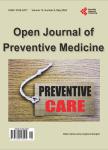Germline Deletion of the Expression of a Human Bispecific Mucosal Immunoglobulin: Genetic Predisposition to Cancer and Communicable Diseases Predominantly among African-Americans
Germline Deletion of the Expression of a Human Bispecific Mucosal Immunoglobulin: Genetic Predisposition to Cancer and Communicable Diseases Predominantly among African-Americans作者机构:NonInvasive Technologies LLC Elkridge MD USA Department of International Health The Johns Hopkins Bloomberg School of Public Health Baltimore Maryland USA
出 版 物:《Open Journal of Preventive Medicine》 (预防医学期刊(英文))
年 卷 期:2021年第11卷第10期
页 面:383-390页
学科分类:083002[工学-环境工程] 0830[工学-环境科学与工程(可授工学、理学、农学学位)] 08[工学]
主 题:Colon Epithelial Cells IgA/IgG Bi-Specific Immunoglobulin Oncolysis Anti-Infective Firewall Heterodimer Gastrointestinal Progenitor Cells (GIP-C†)
摘 要:In a previous report we had reported on the discovery of a novel bispecific immunoglobulin expressed by colonic epithelial cells as they transform into immunomimetic cells during exfoliation (Albaugh et al. (2020) Open Journal of Preventive Medicine, 10, 126-150). Colonic cells isolated from 0.5 gm aliquots of fresh stools (SCSR-10, Fecal Cell Isolation Kit, NonInvasive Technologies, Elkridge, MD) preserved at room temperature for up to one week, with viability of 85% were used to determine the number of cells expressing this novel bispecific immunoglobulin. Over the course of this period (18 years) we recognized that these cells opened the opportunity to investigate the expression of cell membrane biomarkers. As the applications grew, we introduced a new terminology, termed COPROCYTOBIOLOGY*. In this study, we surveyed a cohort of 58 free-living adults for the expression of the newly discovered bi-specific chimeric antibody. Almost all of the subjects showed a strong signal during flow-cytometric evaluation of their stool samples;averaging around 65%. However, two subjects exhibited a total loss of this signal and both these individuals were of African-American lineage (one male and one female). These cells upon culturing in vitro remained defective in contrast to the rest of the group where their progeny continued to generate the antibody. We propose that this signals the existence of a germ-line deletion of the gene for which a novel test (MEDISHIELD†) is suggested. This syndrome may be associated with a lack of response to prophylactic vaccines involving m-RNA.



